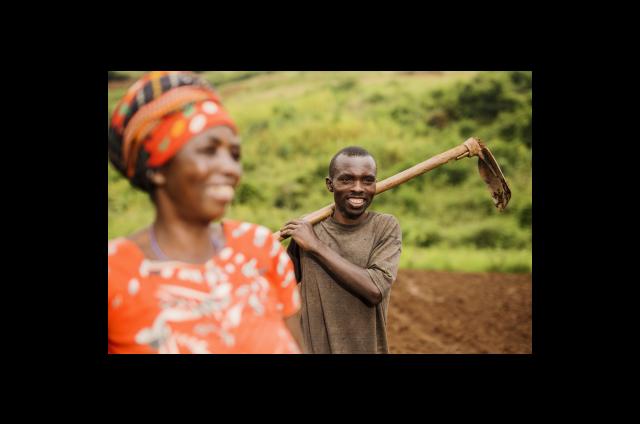How Can Men and Fathers Support Women in Rwanda During Coronavirus?
When we made the difficult choice to suspend our in-person trainings due to COVID-19, our team prioritised maintaining connections with participants — both women and men in our Men’s Engagement Programme.
Not only are quarantines and lockdowns lonely and isolating, restrictions put economic strain on families, especially those in poverty, as people lose the ability make money. Without proper support, all these pressures mean women face an increased risk of gender-based violence (GBV) from other household members.
In Rwanda, our country team continues to call men to understand how they are faring but also remind them of lessons from the Men’s Engagement Programme.
Here’s what they shared on how they’re putting lessons into practice:
Men engage in dialogues with their wives and share power to prevent GBV.
“The foundation of a healthy relationship is a dialogue. For any decision we want to take in our household, we discuss first until we come to a conclusion. We have decided together that my wife will manage all money we gain. If you want to have sustainable and respectful household, never hide anything from your wife; it will increase the trust among partners.” - Callixte
Men are internalising and reflecting on what they’ve learned, changing behaviours and their understanding of social norms to stop hurting their wives.
“Based on the take-home exercise we were given during our last follow-up session, I went and did some self-reflection to identify a type of GBV each one was perpetrating. I realised that I was perpetrating sexual violence: I used to come home late and drunk. I never allowed a discussion around sex with my wife. Since then, I apologised to my wife and promised to never be the same. Now she knows it is also her right to initiate or to refuse sex.” - Daniel
Collaboration, especially on farms, gets the job done faster while reducing the burden on women to work “double shifts” on farms and at home.
“Because we are on this journey, we are working together as a family more, and it has positively impacted our relationship during this period of COVID-19 outbreak. We are less stressed.” - Silas
Amid job losses, market closures, and the shutdown of village savings and loan groups, many men have initiated conversations with their wives about emergency savings, using their resources, and their future financial plans. By having these conversations and encouraging them in men around them, women have power over the future of their family.
“This lockdown has been a time for us to think about long-term projects which can generate income for our family. We are planning to rent land for growing fruit. We have bought a solar electricity system to help our children when they are revising schoolwork.” - Jean Paul
Lockdown has allowed men to spend more time with their children, as well as investing in them.
“During this lockdown period, we are taking this time to set goals we want to achieve with my family. It is also a time to revise homework with my children, teach the little one how to count, children songs…. With my eldest child, we listen together to the online course live on radio and try to understand the content together.” - Edouard
Men see that being a good father means sharing responsibility and power.
“What we are learning through this programme has helped us to pass through this lockdown. Normally in our culture, men don’t stay home with the wife and children; he only comes home late and sometimes drunk. Through this programme we learned the benefits of spending time with family members, developing positive masculine attitudes, and being a good father. We are working together, having lunch together, planning together, and taking care of our children together.” - Philip
The examples they set as fathers can have a long-term impact in shifting social norms as children grow up in households that realise women are powerful, too.
“Before I joined this programme, I had in my mind that taking care of children is a task of the woman and the only role the man could play is food provision, pay school fees, and seek for the heritage. But now I understand that both parents have equal responsibility to take care of a child since the conception. I carry my children; I can feed and wash them.” - Faustin

